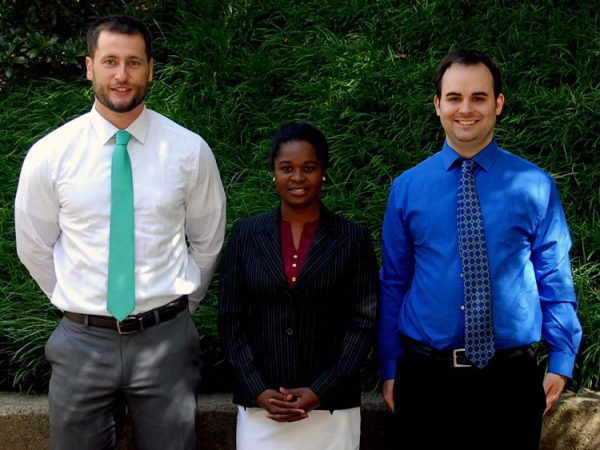Thomas D. Walsh Graduate Research Fellowship Finalists for 2015/2016 Announced

The Thomas D. Walsh Graduate Research Fellowship, made possible by the generous support of Dr. Thomas D. Walsh, recognizes outstanding contributions by M.S. candidates to graduate research. Returning graduate students are eligible for this prestigious award after their first year. The Thomas D. Walsh Graduate Research Fellowship supports the winner with a research assistantship and tuition support through their second year.
During the last application cycle the graduate committee narrowed the applicant pool to three finalists: Corey Garmon, Billy Johnson, and Elleansar Okwei. A brief biographical sketch and research abstract summarize each finalist’s strong application.
The award winner will be announced during the reception for new graduate students on Friday, August 21 at 12:30 PM.
Corey Garmon graduated from UNC Charlotte in 2014 with a BS in chemistry. During his undergraduate studies he joined the research lab he became interested in Dr. Ogle’s research and eventually joined the lab. Upon completion of his Master’s degree he envisions a professional career in industrial research and development.
Dr. Craig Ogle’s research is centered on organic chemistry studying reactions mechanisms with RINMR and synthetic methods development. Corey became interested in a synthetic method development project that quickly morphed into a chemical biology project. His graduate research is focused on the development of a new, highly adaptable platform for bioconjugation based off of the molecule isatoic anhydride. Bioconjugates have found numerous uses in applications across many fields including biology, biochemistry, and therapeutics. Careful design of these bioconjugates is essential for their effective use in applications. There a variety of bioconjugation reagents commercially available however this new platform using isatoic anhydride derivatives offers several advantages. These new reagents allow for the quick and easy installation of a wide variety of chemical functional groups into biomolecules such as proteins, sugars, and nucleic acids. This platform allows for incorporation of a variety of linkers, from stable covalent bonds to labile, cleavable bonds. These reagents are freely water-soluble and exhibit good stability in aqueous conditions while readily reacting with primary and secondary amines, allowing for bioconjugation under physiological conditions. The only byproduct of bioconjugation with these reagents is carbon dioxide, an inoffensive byproduct. Finally, these reagents are self-reporting as they undergo a shift in both absorbance and fluorescence upon bioconjugation.
Billy Johnson earned his B.S. in Chemistry from the University of North Carolina at Charlotte in Fall 2011. He worked as a Chemistry Technician at Gastonia’s Water Treatment Plant before moving on to Special Metals Welding Products Company where he worked in quality assurance. Billy began his graduate studies at UNC-Charlotte Fall 2014. Upon completing his Master’s degree at UNC Charlotte, he plans to pursue a Ph.D. in a materials chemistry program focusing on environmental issues.
Billy currently works in the laboratory of Dr. Jordan Poler which focuses on fundamental studies of complex systems at the nanoscale with regard to applications of materials at the macroscale. Effectively using nanomaterials in different environments means that they must be assembled into useful structures. Specifically, single-walled carbon nanotubes (SWCNTs) are only dispersible in a limited number of solvents, and are essentially useless when dispersed into water where they immediately aggregate. Billy has developed hybrid nanoparticles that use SWCNTs as a scaffolding for a hydrophilic polymer, which allows the nanotubes to be dispersed into aqueous systems. The polymer is an anion-exchange resin (AER) that can be used to remove problematic contaminants from water, while utilizing the immense surface area of the nanotubes. These nanomaterials can be used to remove carcinogenic precursors from potential drinking water sources well below the EPA limits. Additionally, these functionalized nanotubes can be regenerated in a brine solution and reused.
Elleansar Okwei graduated from the University of Virginia in 2014 with a BS in Chemistry (specialization in Biochemistry). She performed undergraduate research in the lab of Linda Columbus working on unraveling substrate specificity of amino acid aminotransferases. Elleansar is currently pursuing her Master’s degree in Chemistry at UNCC, and plans to continue her professional career in a Ph.D. program.
Elleansar is conducting her Master’s research project in the laboratory of Dr. Jay Troutman. A key interest of this lab is the investigation of bacterial polysaccharide biosynthesis, with an emphasis on developing systems for synthesizing these complexes in vitro with enzymes. Ultimately, the Troutman research group targets general methods for the production of any bacterial polysaccharide that can be applied in biomedicine.
Elleansar’s project is focused on understanding the mechanism by which lipid A from Bordetella pertussis is modified with glucosamine, and how this impacts pathogenesis. B. pertussis is the bacterium that causes whooping cough. Even with vaccines, there are over 20 million reported cases and 300,000 deaths per year, worldwide. Alternative treatment strategies are required since current vaccines do not provide life-long immunity. The B. pertussis organism (like other gram-negative bacteria) is able to bypass the human immune system by modifying Lipid A, the component that gives it its toxicity. This project aims to investigate the proposed pathway for this modification. Elucidating the pathway and characterizing the enzymes involved will be beneficial to identifying novel treatment strategies to effectively combat these pathogenic bacteria.